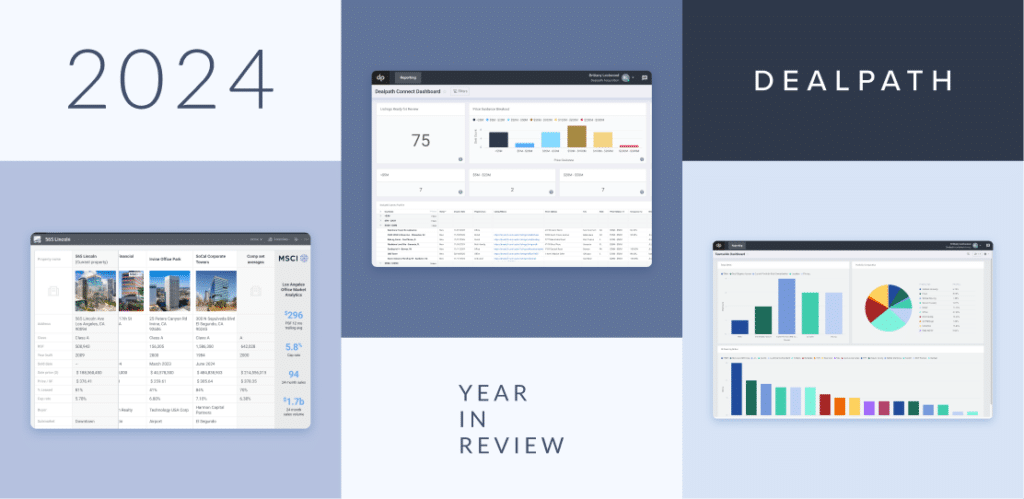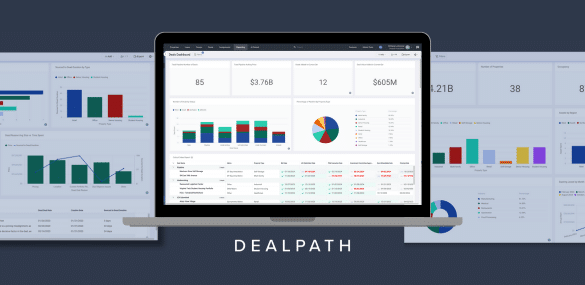Closing a higher volume of deals is key to growing your portfolio and outperforming competitors, but doing so is challenging. How can you effectively scale when every deal requires a significant time commitment across your team? Ultimately, building operational efficiencies is a vital step toward achieving the speed and scale that all teams strive for. The most strategic approach to scaling your investment deal pipeline–without fear of pressing work slipping through the cracks–is digitizing your processes within a deal management software command center.
Leading institutions like Principal Real Estate, Oxford Properties and Blackstone leverage Dealpath to manage deals from source to close via collaborative checklists. In this article, we’ll explore how industry-leading deal teams execute at scale by managing their full pipelines from one command center. Watch our task management webinar to see Product Marketing Manager Brittany Lockwood showcase real examples of how industry leaders utilize these features.
Jump to:
- Building Efficiencies: Why Task Management Is Vital to Achieving Scale
- Task Approvals & Team-Wide Communication
- Configurable Task Lists
- Automate Role-Based Workflow Templates
- Task Dependencies
- Critical Dates
- Supercharge Deal Velocity With Task Management in Dealpath
Building Efficiencies: Why Task Management Is Vital to Achieving Scale
Profitable investment opportunities won’t stay on the market for long. Tasks in Dealpath empower teams to collaborate in lockstep and work more efficiently, ultimately capitalizing on these opportunities before the competition can.
Historically, tracking according to or ahead of critical dates and other deadlines meant prioritizing time-consuming, detail-oriented administrative work. Relying on deal management software reduces this administrative burden. Instead, your highly skilled deal team can remained focused on analyzing and negotiating deals aligned to your investment goals:
- Never drop another ball: Tracking every task for each deal in Dealpath reduces the chance that critical work will slip through the cracks, preventing deals from dying due to simple logistical errors or missed emails.
- Maintain real-time visibility: Communicating about deals in numerous threads creates noise and confusion. Managing tasks in Dealpath ensures your team has the clarity they need about progress, data, and upcoming milestones, with all details stored in one central place.
- Automate the small stuff and scale with ease: Allocate your resources where they matter most with configurable workflows, including automation for simple, repeatable tasks. By spending less time on each deal, you can grow your pipeline efficiently.
Task Management in Dealpath: 5 Features That Allow Industry Leaders to Scale With Ease
1. Task Approvals & Team-Wide Communication
Throughout the lifecycle of a given deal, various stakeholders must submit their approvals at multiple touchpoints. Dealpath offers a simple and clear way to receive and record approvals on every task for each deal, all within the platform. Stakeholders can even approve these tasks directly from their inboxes with task approvals. This not only reduces email traffic, but also creates a clearer system of record.
Given the constant influx of new information about each deal, capturing every important detail is another priority. Rather than sharing this information through easily overlooked emails, team members can “@ mention” each other to keep a running commentary about each deal.
At any time, any team member can refer back to the deal to discover this historical context in seconds.
During the webinar, you’ll see how one of the top five global real estate investors tracks investment committee approvals.
2. Configurable Task Lists
As a deal team leader, having complete visibility into all pipeline deals is paramount. Unfortunately, pipeline spreadsheets rarely provide the answers you’re looking for in an easily digestible manner. Configurable task lists in Dealpath allow you to surface all relevant information, omitting distracting data points. Through this list view, you can analyze tasks with greater granularity, including start and end dates.
You can also prioritize your work more strategically by filtering for deals with tasks that match certain criteria. For example, ahead of a meeting with the legal team, it may be helpful to see which tasks require their input.
See how a multi-generational investment and development firm tracks the latest updates on every task for each deal by watching the webinar.
3. Automate Role-Based Workflow Templates
Once your deal team adds a new deal to its pipeline, there’s no time to waste. The sooner you screen it, the sooner you can begin underwriting.
Templatized task checklists enable you to launch each deal immediately, without recreating the wheel by cobbling together a new checklist. From screening through due diligence and closing, configured checklists help ensure that no tasks slip through the cracks. This repeatable blueprint also streamlines onboarding, helping new hires to understand and adapt to your firm’s unique procedures.
Rather than manually assigning tasks to each team member, Dealpath enables firms to automate task assignments based on roles. For example, analysts might always manage underwriting, while VPs must complete a final review of the IC memo approval. If somebody leaves the company while a deal is in process, that individual’s tasks can be assigned to the person filling that role. Driven by automation, clear, repeatable assignments accelerate deal flow, enabling your firm to capitalize on more opportunities.
Watch the webinar to see examples of the two task assignment approaches that firms can take in Dealpath.
4. Task Dependencies
In a perfect world, your firm might tick every box on the task checklist as soon as possible. Naturally, though, some tasks require other tasks to be completed before it makes sense to assign them out. Task dependencies in Dealpath ensure that tasks are completed in a logical order by tying their due dates. If one task is incomplete, then it’s too early to begin working on the dependent task.
Task dependencies also provide an intuitive, low-effort way to keep critical dates updated and timelines in order. When two tasks are dependent on each other, critical date changes cascade into the dependent tasks, keeping timelines on track.
See how one of the top homebuilders in the U.S. leverages dependencies to assign tasks in the correct order in the webinar.
5. Critical Dates
Accurately tracking critical dates can provide an actionable window into deal progress across the organization, from deal teams, to senior management and beyond. From as early on as underwriting, it’s critical for leadership to have visibility into the timelines for ongoing deals.
By capturing critical dates in Dealpath, you can report on milestone progress, see which team members might be overloaded or available to take on more, and what deals might be approaching closing.
In the webinar, you’ll see how a Twin Cities developer tracks every critical date for each deal in their pipeline to prioritize resources accordingly.
Supercharge Deal Velocity With Task Management in Dealpath
Boosting deal flow puts your firm in a strong position to build a greater competitive advantage and close more deals. To hear more actionable tips and see real Dealpath customer workflow examples, watch the webinar on demand now.
Watch On-Demand Webinar



